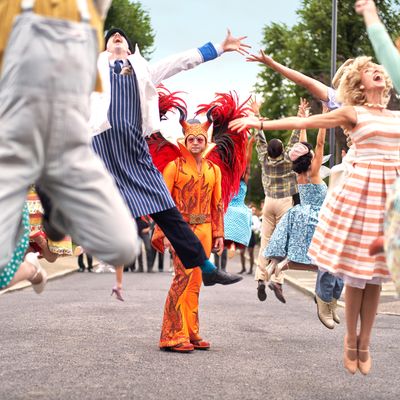
At the start of Rocketman, Taron Egerton as a plumed, winged Elton John staggers down a dim corridor to what turns out to be a group therapy session — although one in which Elton, per usual, sucks up all the oxygen. He’s going to regale us with the story of his rocket-like rise, his plunge into alcohol and drug abuse, and his continuing struggle to navigate life as “a poofter, a fairy, a queer” (his words) who was never unconditionally loved by his repressed, middle-class dad and self-centered mum. Oi, ‘e ‘ad it ‘ard, did our Reg — Reginald Kenneth Dwight by birth, Elton Hercules John after another musician tells him, “You have to kill the person you were born to be to become the person you want to be,” and then gives him a smooch. But the person he was “born to be” keeps turning up in Elton’s fantasies: the little Reggie glaring at him over the piano keys, as if to say, “Remember my hurt.” How could we have ever forgotten it?
In common with most recovery stories, Rocketman boils down to a fat lump of self-pity, but the music does leaven things. It will inevitably be compared to last year’s Bohemian Rhapsody, in part because they share an antagonist (music manager John Reid, played by Lord Baelish in BR and Rob Stark here), in part because Rocketman’s director, Dexter Fletcher, took over (sans credit) on BR when Bryan Singer was bounced for myriad allegations of sexual assault. But BR confined its numbers to performance sequences, while Rocketman has Elton and others break the fourth wall and burst into song — making this both a performance film and a “jukebox musical” along the lines of Jersey Boys and dozens of lesser works that fail to shape a dramatic arc from assemblages of disparate hits.
Rocketman has unusual dramatic heft for a jukebox musical, but that’s a big curve on which to grade — the characters are still skin-deep. The problem isn’t the shallowness: BR was shallower but still managed to convey the depth of Freddy Mercury’s commitment to creating a persona that would levitate audiences. In Rocketman, Fletcher has to levitate the audience literally to achieve the same effect. I have not misused literally: During Elton’s commercial breakthrough at L.A.’s Troubadour, Elton literally levitates and the audience literally levitates along with him. I, meanwhile, deflated. It was one of the silliest things I’ve ever seen.
Until then, the movie has been a grim slog. Reg’s dad, Stanley (Steven Mackintosh), is a former musician but shares little with his son. It’s not that he’s self-contained, it’s that his self contains nothing. He’s a vacuum. Rather than wither from inattention, Reg’s mum, Sheila (Bryce Dallas Howard with a respectable British accent), canoodles with a local painter, Fred (Tom Bennett), while it’s left to Reg’s gran, Ivy (Gemma Jones), to encourage the boy’s piano playing. The odd thing is that the movie uses songs from Elton’s repertoire as if they’re umbilically connected to his life — but the words are all by Bernie Taupin (played onscreen by Jamie Bell), whose method was to present Elton with a finished lyric. The songs would be more appropriate for a jukebox musical called Bernie! At a party at Mama Cass’s after Elton’s Troubadour triumph, Taupin slips off with a young woman while Elton sits, abandoned, and gazes at a girl talking to some musicians. “Blue jean baby,” he sings, “L.A. lady … ” The performance of “Tiny Dancer” is so incongruous that all I could think of was a bit from The Sunshine Boys: “How do you like that? Saul Burton died.” “Who?” “Saul Burton the songwriter. Eighty-nine years old. He went just like that from nothing. You know what kind of songs he wrote? Shit. ‘Lady, lady, be my baby.’ Lady rhymes with baby. Oy. No wonder he’s dead.”
What’s more annoying is that Rocketman views Elton John’s career as if his principal influences were Elvis Presley and the Beatles. You’d never know how retro “Crocodile Rock” was in its time, and how Elton was emboldened in his drag-circus fashion choices by the rise of Marc Bolan, David Bowie, and other glam pioneers. Egerton does fine vocal impersonations and nails Elton’s mixture of entitlement and neediness, but he’s almost too good in suggesting how synthetic John’s whole get-up was, in how little joy there was in John’s virtuosity. It’s like Bohemian Rhapsody without the rhapsody. At his nadir, he’s alone in his room gobbling pills, snorting coke, and gazing down at his teeming pool party: The Gay Gatsby.
Having heard some horror stories about Elton’s backstage behavior in the old days, I was glad when in the first scene he tells the people in his therapy group that he has problems with drink, drugs, and anger management. Maybe we’d see some of that anger! Alas, the Elton of Rocketman is more sinned against than sinning. As John Reid, his manager and sometime lover, the Scots-born Richard Madden is smoking hot (as if he’d internalized the dynamite that was strapped to him in Bodyguard) but signals his Machiavellian intentions so broadly that there’s never even the smallest hope that the relationship could work out. Poor little Reg! So rich, so improperly loved. The credits tell you that John has been sober more than a quarter century and met and married a man who’d love him properly — but why wasn’t that part in the movie? It might be that Oscar bait music biopics don’t know how to handle joy unless it’s part of a larger victimization. I guess that’s why they call it the blues.





